|
|
|
Sort Order |
|
|
|
Items / Page
|
|
|
|
|
|
|
| Srl | Item |
| 1 |
ID:
142612


|
|
|
|
|
| Summary/Abstract |
The Riffian rebel leader Mohammed Abd el-Krim Al-Khattabi (1882–1963) became an important early guerrilla leader by successfully initiating extensively organized resistance in the Moroccan Rif against Spanish and French imperial power in the early 1920s. The Rif War triggered a wave of adventure films since the 1930s. This article will look at some of these, especially Sergeant Klems (1971) and The Wind and the Lion (1975), and suggest that they can be seen in terms of the wider impact of screen Orientalism derived from the iconic film Lawrence of Arabia (1962) directed by David Lean. The article will show that these films promoted what it terms a colonial gaze by underlining many stereotyped cinematic clichés relating to the Islamic cultural area and Abd el-Krim's revolt that stretch back to the early history of cinema.
|
|
|
|
|
|
|
|
|
|
|
|
|
|
|
|
| 2 |
ID:
142616
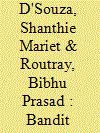

|
|
|
|
|
| Summary/Abstract |
Its long history and destabilising impact notwithstanding, banditry has received scant academic attention in India. Confined mostly to occasional and incident-driven media reportage, the socioeconomic factors that fuelled insurgencies and banditry and the milieu which provided a context for the operations of these outlawed movements received little attention. Cinematic representation of the social banditry phenomenon in the country, based on little or no first-hand research, as a result, suffered from ingenuousness and failed to emerge from the romanticised depiction of insurgency and terrorism which Bollywood, India's movie industry, is known for. Bandit Queen, the biopic of Phoolan Devi, in contrast, stands apart. Scathing criticisms regarding its use of sex as a tool for commercial success notwithstanding, the movie succeeds in drawing the viewers' attention to the persisting social cleavages in India. Using rape as its central theme, it shocks its audience into acknowledging the reality and relevance of social banditry in a country where governance remains an absent entity for a vast majority of its people. That most Bollywood movies depicting social issues have continued to remain aground in romanticism and irrelevance makes Bandit Queen even more relevant in times to come.
|
|
|
|
|
|
|
|
|
|
|
|
|
|
|
|
| 3 |
ID:
142617
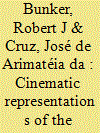

|
|
|
|
|
| Summary/Abstract |
This essay provides an overview of the eras of Mexican cinema followed by an analysis of 10 Spanish-language narco cinematic representations, an overview of the eras of American cinema followed by an analysis of 10 English language narco cinematic representations, and a conclusion that compares and contrasts the Mexican and US narco war cinematic experience. Due to divergent national trajectories – Mexico is engulfed in narco violence and corruption while the United States is not – more differences than similarities exist between these national cinematic genres. Dark spirituality themes are also increasingly evident in more recent narco war films.
|
|
|
|
|
|
|
|
|
|
|
|
|
|
|
|
| 4 |
ID:
142614
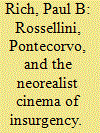

|
|
|
|
|
| Summary/Abstract |
This article examines the tradition of Italian neorealism and the importance it has for films depicting guerrilla insurgencies. It looks in particular at the two films by Roberto Rossellini Rome Open City and Paisa as well as the later film by Nanni Loy Four Days in Naples. It then proceeds to locate Gillo Pontecorvo's iconic film The Battle of Algiers within this neorealist tradition and examines the degree to which the director succeeded in continuing the basic traditions of neorealism into the context of the Algerian war of Independence. The article concludes that while this film remains of great interest it should be situated in the period when it was produced and is in many ways radically disconnected from many insurgent movements of the present day.
|
|
|
|
|
|
|
|
|
|
|
|
|
|
|
|
| 5 |
ID:
142615


|
|
|
|
|
| Summary/Abstract |
Vietnam was a complex conflict, which historians and political scientists have struggled to understand. Some of the bitterest disputes in the historiography revolve around the US approach to counterinsurgency in Vietnam. Many different facets of the war have received the attention of filmmakers, and an examination of their work suggests new ways of thinking about the conflict. This article considers film portrayals of three phases of the Vietnam War – firstly, the early period of ‘political action’, then the advisory period, and finally the Americanization of the war after 1965. It suggests that by examining the experiences of participants in each of these phases, Vietnam War cinema helps to illustrate the problems that faced various American approaches to counterinsurgency in the conflict. Combined with the importance of films in determining popular perceptions of both historical conflicts and counterinsurgency in general, it suggests that they are worthy subjects of study and critique.
|
|
|
|
|
|
|
|
|
|
|
|
|
|
|
|
| 6 |
ID:
142611
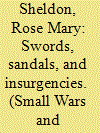

|
|
|
|
|
| Summary/Abstract |
This article explores the question of why so few insurgencies from the ancient world have ever made it onto the big screen. Many of these stories have been made into documentaries, but have been ignored by Hollywood. Even those events that have been made into Hollywood films, like the uprising of Spartacus, do not show any of the successful uprisings, only the defeats. Among the possible reasons may be Hollywood's fascination with big wars and big battles rather than small wars because they are more cinematic. Another reason is that American movies are reluctant to show successful slave uprisings or insurgencies against great powers. In the end, all movies are about the present, not the past, and thus Western bias will side with the imperial power, not the terrorist.
|
|
|
|
|
|
|
|
|
|
|
|
|
|
|
|
| 7 |
ID:
142613
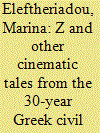

|
|
|
|
|
| Summary/Abstract |
Greek cinema has documented and debated the civil war and its repercussions under different angles, largely defined by censorship, the general political climate, and cinematic trends. This article, first, offers a retrospective that traces the evolution of Greek cinema's ‘takes’ on the civil war vis-à-vis the political changes. Second, it provides an in-depth analysis of Costas Gavras’s film Z, examining its relevance to Greece and how political conflict, in general, is cinematically depicted. The article argues that Z and Gavras’s cinema have been affected and have affected the Greek political situation. However, while Z has spearheaded an international cinematic genre (political thriller), it had minimal effect on the Greek cinema.
|
|
|
|
|
|
|
|
|
|
|
|
|
|
|
|
|
|
|
|
|